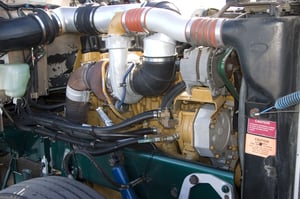 GPS tracking devices have become fairly common over the last couple of decades. As these devices have become more commonplace, and the number of fleet management companies that offer them increase, there has been an attitude that these systems are largely interchangeable, that one GPS tracking solution is as good as another.
GPS tracking devices have become fairly common over the last couple of decades. As these devices have become more commonplace, and the number of fleet management companies that offer them increase, there has been an attitude that these systems are largely interchangeable, that one GPS tracking solution is as good as another.
But, are all GPS tracking device solutions really the same?
In short, the answer is no.
While many features of GPS have become standard, there can be significant differences between specific GPS tracking devices and tracking solutions which affect the cost and quality of a given GPS solution.
Here’s a short list of specific aspect of a GPS device or tracking solution that may be different depending on the device, fleet management company, or level of service you choose:
#1: Update Frequency
Most people think of GPS tracking devices as being constantly on, giving position updates every second that the vehicle/equipment they’re attached to is active. For the vast majority of GPS devices, this isn’t actually the case.
Constant position updates require the use of a lot more data and resources than the occasional position ping. Systems that update in “real time” typically collect position data once every 5 minutes or so to report to a dedicated server.
Other, more passive systems, collect data throughout the day and store it in the device’s memory to report once a day or when the vehicle returns to the lot.
High update frequency helps to increase the granularity of your control over vehicles in the field. Additionally, the more frequently your GPS trackers report, the faster you can be notified of and respond to events such as vehicles going off-route.
However, higher update frequency typically means higher monthly costs for GPS, so it’s a balancing act.
#2: Vehicle/Equipment Diagnostics
 Some GPS tracking devices can be tied into a vehicle’s on-board diagnostics system, allowing for the remote monitoring of key vehicle performance statistics such as RPMs, fuel consumption, or engine temperature as well as when specific trouble alerts are triggered.
Some GPS tracking devices can be tied into a vehicle’s on-board diagnostics system, allowing for the remote monitoring of key vehicle performance statistics such as RPMs, fuel consumption, or engine temperature as well as when specific trouble alerts are triggered.
This remote diagnostic capability requires both a GPS tracking device capable of collecting and transmitting on-board vehicle diagnostic data and a fleet management software that can interpret and display the information.
If the fleet management company doesn’t have both, then it won’t be able to provide this incredibly useful service.
#3: GPS Management Software
Speaking of fleet management software, the GPS tracking software that comes with your fleet tracking devices will be vastly different depending on the company that you choose to get your GPS trackers from.
These software programs can vary wildly in terms of data provided, user-friendliness, and cost depending on the fleet manager you use.
Ideally, a GPS fleet management software program should give you the information that’s most relevant to your business needs without overloading you with unnecessary minutiae. Additionally, the fleet management company should be willing to work with you to teach you the ins and outs of your fleet management software to make the software easier to use.
There are a lot of other things about your GPS tracking solution that might change depending on which solution you use. For more info about GPS tracking devices for fleet vehicles, check out some of our other resources!
Like what you're reading? Subscribe to our blog.
Get our latest posts straight to your inbox.
Subscribe to Our Blog





